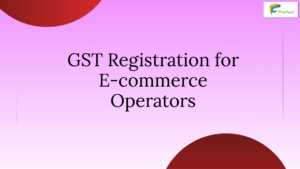
Introduction: The E-commerce Boom and the GST Reality
Launching an online business is exciting, but it comes with legal and tax responsibilities that many entrepreneurs overlook. One of the most common mistakes e-commerce operators make is assuming they do not need GST registration due to low turnover. However, for online sellers, the rules are different. This guide explains why GST registration in Delhi and GST registration in Lucknow is essential for e-commerce operators, the process to follow, and how professional assistance can make compliance simple and hassle-free.
Understanding GST: A Primer for E-commerce Operators
Goods and Services Tax (GST) is a unified tax structure implemented across India to streamline indirect taxes. For e-commerce businesses, GST plays a vital role because:
- It applies to both goods and services.
- Tax Collected at Source (TCS) provisions are mandatory for sales via platforms like Amazon, Flipkart, and Myntra.
- It ensures transparency and seamless interstate trade.
Key terms you should know:
- GSTIN: Goods and Services Tax Identification Number assigned to your business.
- TCS (Tax Collected at Source): Tax collected by e-commerce platforms on behalf of sellers.
- ITC (Input Tax Credit): Credit that allows you to offset GST paid on purchases against your GST liability.
Who Needs to Register for GST in E-commerce?
As per Section 24(ix) of the CGST Act, 2017, any business supplying goods through an e-commerce operator is required to register for GST, irrespective of turnover.
Mandatory GST Registration Applies to:
- Online sellers using marketplaces like Amazon, Flipkart, or Meesho.
- Service providers selling digital goods or services online.
- Cross-border e-commerce operators shipping goods outside India.
Key Takeaway:
There is no turnover threshold for e-commerce sellers. Even if your turnover is below ₹40 lakhs (for goods) or ₹20 lakhs (for services), you still need GST registration to sell online.
Benefits of GST Registration for E-commerce Operators
Getting your GST registration in Delhi or GST registration in Lucknow is more than a legal requirement. It also provides:
- Legal Recognition: Your business is officially recognized as compliant with Indian tax laws.
- Input Tax Credit (ITC): Claim GST paid on raw materials, packaging, commissions, and logistics.
- Nationwide Sales Access: Sell across state borders without restrictions.
- Enhanced Credibility: Platforms and customers trust registered sellers more.
GST Registration Process: Step-by-Step Guide
Here is a simplified breakdown of how e-commerce operators can register for GST online:
Documents Required:
- PAN Card of the business or proprietor.
- Aadhaar card of the business owner or partners.
- Business address proof (rent agreement, electricity bill).
- Bank account details with a cancelled cheque.
- Passport-size photographs of owners or directors.
Registration Steps:
- Visit the GST portal and create a new account.
- Submit Part-A of the GST REG-01 form with your PAN, email, and mobile.
- Verify details with OTP and receive your temporary reference number (TRN).
- Submit Part-B of the GST REG-01 form with all required documents.
- Receive GSTIN after successful verification.
Common Mistakes to Avoid:
- Entering incorrect business category.
- Submitting outdated or mismatched documents.
- Ignoring TCS compliance for e-commerce platforms.
GST Returns and Compliance for E-commerce Sellers
Once registered, compliance does not end with obtaining GSTIN. E-commerce sellers must:
- File GSTR-1 (outward supplies) and GSTR-3B (monthly summary return).
- Reconcile TCS collected by platforms with your sales records.
- Maintain proper invoices and accounting records to avoid penalties.
Penalties for Non-Compliance:
- Late filing fee: ₹50 per day (₹20 per day for NIL returns).
- Interest: 18% per annum on outstanding tax.
- Suspension or cancellation of GSTIN in severe cases.
GST and E-commerce Platforms: What You Need to Know
E-commerce platforms play a critical role in GST compliance:
- They deduct TCS (1%) on sales made through their platform.
- They report these details in their monthly filings.
- Sellers must reconcile TCS statements with their GST filings to claim credit.
Example:
If you are selling via Amazon in Delhi or Flipkart in Lucknow, your GST compliance is linked to the platform’s TCS deductions.
Frequently Asked Questions about GST Registration for E-commerce
- Do I need GST registration if my turnover is below ₹20 lakhs?
Yes, for e-commerce sellers, GST is mandatory irrespective of turnover. - Can I sell on Amazon or Flipkart without GST?
No, major e-commerce platforms require GSTIN at the time of seller onboarding. - How long does it take to get GSTIN?
Usually 5–7 working days with correct documentation and verification. - Can I register GST in one state and sell in another?
Yes, GST registration allows interstate sales, but you may need multiple registrations if you operate warehouses in multiple states.
Why Choose FilingPool for GST Registration in Delhi and Lucknow?
FilingPool specializes in helping e-commerce operators stay compliant with GST.
Our Services Include:
- Fast GST registration in Delhi NCR and Lucknow.
- Dedicated compliance team for TCS reconciliation.
- GST return filing and advisory services.
- Assistance in handling notices or discrepancies.
Why Businesses Prefer Us:
- Hassle-free process with expert guidance.
- Error-free applications to avoid rejection.
- Long-term compliance support, not just one-time registration.
Conclusion: Start Selling Smart with GST Compliance
GST registration is the foundation of a compliant and scalable e-commerce business. Whether you operate in Delhi, Lucknow, or anywhere in India, registering on time ensures smooth sales, better credibility, and access to nationwide markets.
Ready to register? Contact FilingPool today and get your GST registration process handled by experts.


